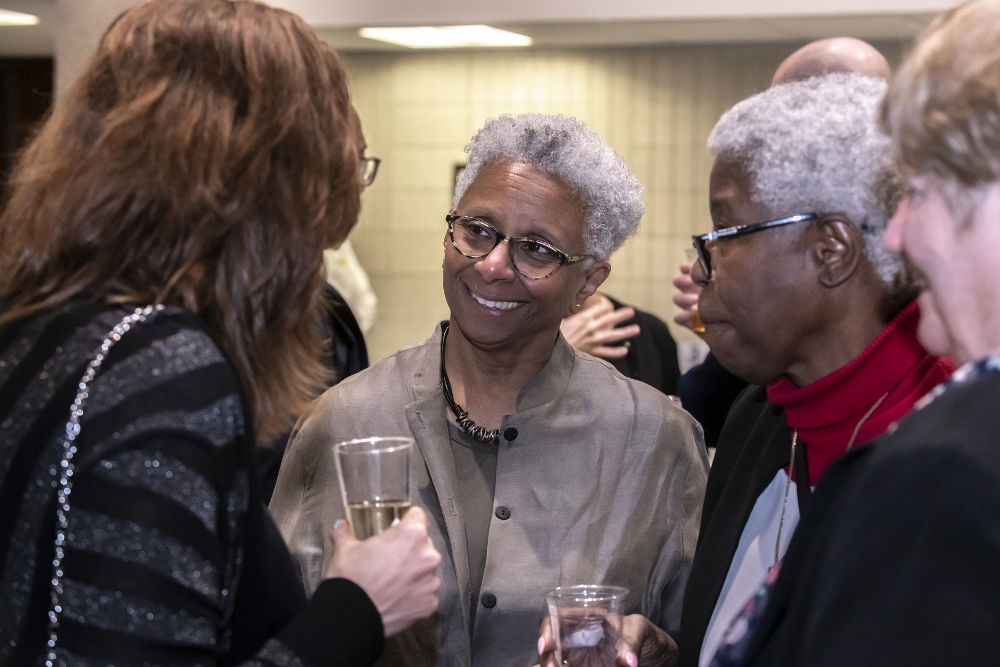
Theologian M. Shawn Copeland, center, speaks to guests on April 26 during the Boston College conference held in her honor. (Boston College/Lee Pellegrini)
This past weekend, Boston College hosted a conference on campus honoring the career and scholarly accomplishments of theologian M. Shawn Copeland, who is retiring from the Jesuit university's Theology Department at the end of this academic year. The event brought together colleagues, former students and others touched by the life and work of this extraordinary thinker, scholar, teacher and Christian disciple.
The breadth and depth of her remarkable oeuvre are hard to summarize in the limited space of a column. Nevertheless, I want to take this occasion to highlight at least a few of the many reasons you should know and read her work.
Copeland is one of the most influential, creative and faithful Catholic theologians of our time. For Copeland, being a professor of theology is not merely a career, but has always been and remains a profound vocation. In a 2003 interview with NCR on the occasion of her installation as president of the Catholic Theological Society of America (CTSA), she explained, "By using the phrase vocation, I wanted to signal that our theological work, our theological lives, are not so much about careerism, upward mobility, but they are about a response to the word made flesh."
The practice of theology, and theological research and teaching, is never for its own sake, but always for the church and world. "So the world in which we are living is really presenting us, without any effort on our part, a certain demand," Copeland added. "And it's asking us, for whom do we do our theology and by whom? And I think the 'by whom' is really about the word made flesh."
Last year, CTSA bestowed on Copeland its highest honor, the John Courtney Murray Award. She is the first African American theologian to receive this distinction in the award's nearly 50-year history. Theologian Mary Hines, CTSA president at the time, lauded Copeland's groundbreaking contributions to Catholic theology and noted that her "pioneering and prophetic scholarship ... confronts us with the uncomfortable truth of the cost of discipleship."
In response, Copeland took the opportunity to express that this significant recognition "is not just about me, it is about us; this is our story." She explained:
Honoring me also calls us to engage the work of scholars who, in response to the Incarnation of our God, have placed the life, dignity and flourishing of God's human creatures at the center of their intellectual praxis: theologians who insist that women's lives, differently abled lives, migrant lives, refugee lives, queer lives, trafficked lives, persecuted lives, brown and red and yellow and white and, yes, black lives all matter.
Having the opportunity this weekend to reflect alongside her colleagues, as well as others who have, like me, had the privilege of studying with her or have been mentored by her, I am reminded of the consistency of her witness to her vocation and how she has modeled that for so many women and men over the years.
Advertisement
During her presentation at this weekend's conference, Boston College theologian Nancy Pineda-Madrid expressed well the feeling of those gathered in Copeland's honor, stating: "Shawn is the model of the Catholic theologian," adding, "Her presence always raises the bar."
In part, what makes Copeland such a model for Catholic theologians is her commitment to history and memory in theology, particularly the erased or ignored histories and dangerous memories of the silenced, abused, enslaved, rejected, marginalized and discarded children, women and men of color in our world. Her faithfulness to the Gospel necessarily grounds her work in the Christian tradition, but never leaves the tradition to merely be passed on or simply repeated uncritically as if it were just a collection of propositions.
If we as Christians profess belief in the God who became flesh and lived among us, taught, healed and ministered to all women and men, but reached out in a particular way to those at the margins of his first-century society, then we too must take seriously what the implications of faith in Christ actually means. And this is exactly what Copeland does in her work.
At the outset of her 2010 book on theological anthropology, titled Enfleshing Freedom: Body, Race, and Being, Copeland explains that her project "focuses the Christian question of what being human means on the body, most particularly on the bodies of black women."
Drawing on the dangerous memory of the treatment of black women over history, Copeland continues: "For centuries, black female bodies have been defiled, used, and discarded, quite literally as refuse — simply because they are female and black, black and female."
Her starting point rightly shifts the subject from the nearly exclusive presumption of white male normativity in thinking about human personhood in the Christian tradition to the "suffering bodies" of history, with whom Jesus Christ — "the suffering body at the heart of Christian belief" — was and remains in solidarity.
Among theologians, Enfleshing Freedom is widely recognized as a modern theological classic. Copeland's masterful engagement with the whole range of the Christian theological tradition, continental philosophical thought, critical theory, slave narratives, numerous historical sources, various works of literature, and the lived experience of real women and men calls the reader to ongoing conversion and models for theologians what the task of constructive theological reflection looks like in practice.
In her latest book, Knowing Christ Crucified: The Witness of African American Religious Experience, Copeland takes up the subject of the cross, asking how this central tenet of Christian faith relates to, can be informed by and responds to the "violation of human persons and the potential of their flourishing in ecclesial, cultural, and social" contexts. What unfolds over the pages is the development of an authentically Catholic "practical-political theology," which takes seriously the dangerous memories of history and faith.
As in her other work, Copeland does not shy away from the stark and painful realities of subjugation, abuse and violence, which disproportionately harms and erases children, women and men of color, particularly in the United States with its abhorrent history of chattel slavery and the enduring realities of systemic racism.
The power and wisdom of Copeland's theological work are peerless, which was attested to in the dozens of presentations delivered in her honor last weekend. But what many folks, even those already familiar with her academic writing, might not know is that she is one of the holiest people doing theology today. She is a theologian in the spirit of the medieval Franciscan St. Bonaventure, who notably described theological inquiry as the pursuit of wisdom on the path to holiness. She is a person of prayer and it shows in her work and in her life. And she is someone who recognizes the communal enterprise of theology, which is always done with and for the church, anchored as it is in Jesus Christ — the Word made flesh.
When I think of Copeland, I think not only of her scholarship, but also of a descriptor from the Book of Wisdom (7:27), which was retrieved by theologian St. Joseph Sr. Elizabeth Johnson for helping the church renew its understanding of the communion of saints: "friends of God and prophets." As a woman of profound faith, Copeland is undoubtedly a friend of God, and as a Catholic theologian of the highest order, she continues to be a prophet that our church and world so critically needs.
[Daniel P. Horan is a Franciscan friar and assistant professor of systematic theology and spirituality at Catholic Theological Union in Chicago. Follow him on Twitter: @DanHoranOFM.]
Editor's note: Don't miss out. Sign up to receive an email notice every time a new Faith Seeking Understanding column is published.








